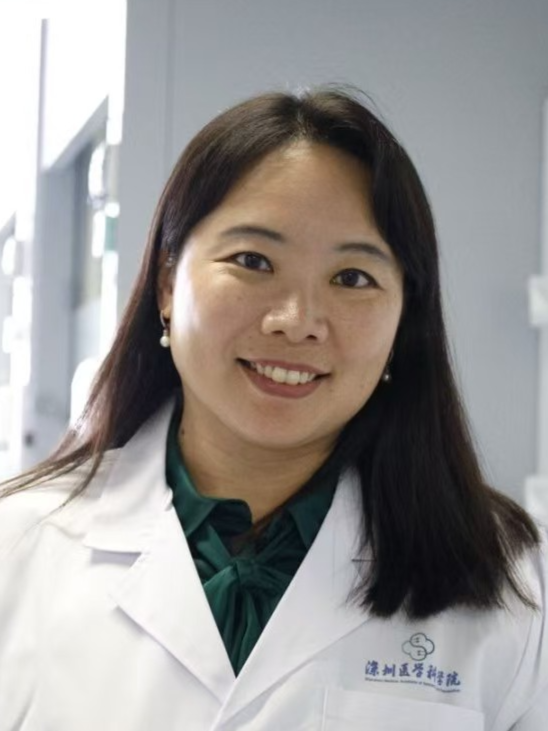
Principal Investigator
Microbiome
wangleyao(at)smart.org.cn
2025 - PresentPI, Shenzhen Medical Academy of Research and Translation
2024 - 2025Scholar, National Institute of Health
2024 - 2025Assistant Professor, University of Massachusetts
2022 - 2024Assistant Professor, Washington University in St. Louis
2018 - 2022Lecturer, Washington University in St. Louis
2013 - 2017Postdoctoral Researcher, Yale University
2010 - 2011Master's Student in Public Health, Johns Hopkins University
2008 - 2010Postdoctoral Researcher, Johns Hopkins University
2003 - 2008Doctoral Student, Microbiology, Fudan University
1999 - 2003Bachelor, Biotechnology, Nankai University
Dr. Wang Leyao's research team focuses on the fields of human microbiomics, human genomics, and pathogen-host interactions, dedicated to revealing the interaction mechanisms among hosts, microorganisms, and pathogens, as well as their impacts on human health. The team mainly employs population cohort research methods, molecular biology research techniques, and cutting-edge bioinformatics analysis methods to explore the following scientific issues:
1. Mother-to-infant vertical transmission of the human microbiome. By establishing global birth cohorts and conducting long-term follow-ups, the team explores the principles of intergenerational transmission of beneficial microbiota and is committed to studying the influence of differential factors such as the environment on the early formation of microbial flora.
2. Genetic evolution of the human microbiome and other pathogens. Using sequencing methods and bioinformatics approaches, the team studies the genetic evolution of the human microbiome and other pathogenic microorganisms, as well as their mutual regulatory relationships with hosts and immune-related diseases.
3. The impact of climate change on the human microbiome. Through population-based studies and molecular biology research methods, the team aims to reveal and clarify how climate change, especially extreme weather events, alter the human microbiome and lead to disease development.
2024, National Institutes of Health Climate and Health Scholar, USA
2020, Distinguished Global Health Mentor Award, Washington University, St. Louis, Missouri
2015, Ruth L. Kirschstein National Research Service Award (NRSA), Individual Postdoctoral Fellowship, National Institutes of Health - National Institute of Allergy and Infectious Diseases, Bethesda, Maryland
1. Wang R, de Ángel Solá D, Rivera-Mariani FE, Bolaños Rosero B, Rosario Matos N, Wang L. Dysbiosis in the Nasal Mycobiome of Infants Born in the Aftermath of Hurricane Maria. Microorganisms. 2025 Jul 31;13(8):1784. doi: 10.3390/microorganisms13081784.
2. Quinn BE, Reyes Rodríguez JA, Sam EK, Duliman J, Denn E, Lee S, Shan L, Kuti C, Nyann BI, Rosario-Matos N, Wang L. The nasal microbiome in early infancy is primarily shaped by the maternal nasal microbiome. J Allergy Clin Immunol.2025 May 16:S0091-6749(25)00553-6. doi: 10.1016/j.jaci.2025.05.004.
3. Ren C, Hao S, Wang F, Matt A, Amaral MM, Yang D, Wang L, Zhou C. Dynamic contrast optical coherence tomography (DyC-OCT) for label-free live cell imaging. Commun Biol. 2024 Mar 6;7(1):278. doi: 10.1038/s42003-024-05973-5.
4. Zhang A, de Ángel Solá D, Acevedo M, Cao L, Wang L, Kim JG, Tarr P, Warner BB, Rosario N, Wang L. Infants exposed in utero to Hurricane Maria have gut microbiomes with reduced diversity and altered metabolic capacity. mSphere. 2023 Oct 24;8(5):e0013423. doi: 10.1128/msphere.00134-23.
5. Kim JG, Zhang A, Rauseo AM, Goss CW, Mudd PA, O’Halloran JA, Wang L. The salivary and nasopharyngeal microbiomes are associated with SARS-CoV-2 infection and disease severity. J Med Virol. 2023 Feb;95(2):e28445. doi: 10.1002/jmv.28445.
6. Kim JG, Zhang A, Rauseo AM, Goss CW, Mudd PA, O’Halloran JA, Wang L. The nasopharyngeal and salivary microbiomes in COVID-19 patients with and without asthma, Allergy. 2022 Dec;77(12):3676-3679. doi: 10.1111/all.15438.
7. Wang L, DeWan AT. Microbiome links breastfeeding and asthma protection: a cohort study helps elucidate this underlying player. J Allergy Clin Immunol. 2022 Sep;150(3):587-588. doi: 10.1016/j.jaci.2022.07.017.
8. Lee S, Zhang A, Flores MA, de Ángel Solá D, Cao L, Bolanos-Rosero B, Wang L, Godoy-Vitorino F, Matos NR, Wang L. Prenatal exposure to Hurricane Maria is associated with an altered infant nasal microbiome, J Allergy Clin Immunol Glob. 2022 Aug;1(3):128-137. doi: 10.1016/j.jacig.2022.05.001.
9. Lee S, Zhang A, Liu L, Salvo D, Wang L. Changes in physical activity and sedentary time among children with asthma during the COVID-19 pandemic and influencing factors. J Asthma. 2022 May;1-9. doi: 10.1080/02770903.2022.2070761.
10. Cao L, Lee S, Krings J, Rauseo A, Reynolds, D, Presti, R, Goss C, Mudd P, O'Halloran J, Wang L. Asthma in COVID-19 suspected and diagnosed patients. Ann Allergy Asthma Immunol.2021 May;126(5):535-541.e2. doi: 10.1016/j.anai.2021.02.020.
11. Chen R, Wang L, Koch T, Curtis V, Yin-DeClue H, Handley SA, Shan L, Holtzman MJ, Castro M, Wang L. Gender effects in the association between airway microbiome and asthma. Ann Allergy Asthma Immunol. 2020 Dec;125(6):652-657.e3. doi: 10.1016/j.anai.2020.09.007.
12. de Ángel Solá DE, Wang L, Vázquez M, Méndez-Lázaro PA. Weathering the pandemic: How the Caribbean Basin can use viral and environmental patterns to predict, prepare, and respond to COVID-19. J Med Virol. 2020 Sep;92(9):1460-1468. doi: 10.1002/jmv.25864.
13. Wang L*, de Ángel Solá D, Acevedo Flores M, Schriefer A, Wang L, Gerónimo López K, Chang A, Warner B, Shan L, Holtz LR, Rosario Matos N. Prenatal food insecurity post Hurricane Maria is associated with decreased Veillonella in the infant gut. Pediatr Res.2020 Dec;88(6):917-924. doi: 10.1038/s41390-020-0839-0.(*Corresponding author)
14. Coverstone A, Wang L, Sumino K. Beyond RSV and RV in the pathogenesis and exacerbation of asthma. Immunology and Allergy Clinics of North America. 2019 Aug;39(3):391-401. doi: 10.1016/j.iac.2019.03.007.
15. Wang L*, de Ángel Solá D, Mao Y, Bielecki P, Zhu Y, Sun Z, Shan L, Flavell R, Bazzy-Asaad A, DeWan A. Family-based study reveals decreased abundance of sputum Granulicatella in asthmatics. Allergy. 2018 Jun; doi: 10.1111/all.13493. (*Corresponding author)
16. Mao Y, Ding P, Wang Y, Ding C, Wu L, Zheng P, Zhang X, Li X, Wang L, Sun Z. Comparison of Culturable Antibiotic-resistant Bacteria in Polluted and Non-Polluted Air in Beijing, China. Environment International. 2019 Jul 5;131:104936. doi: 10.1016/j.envint.2019.104936.